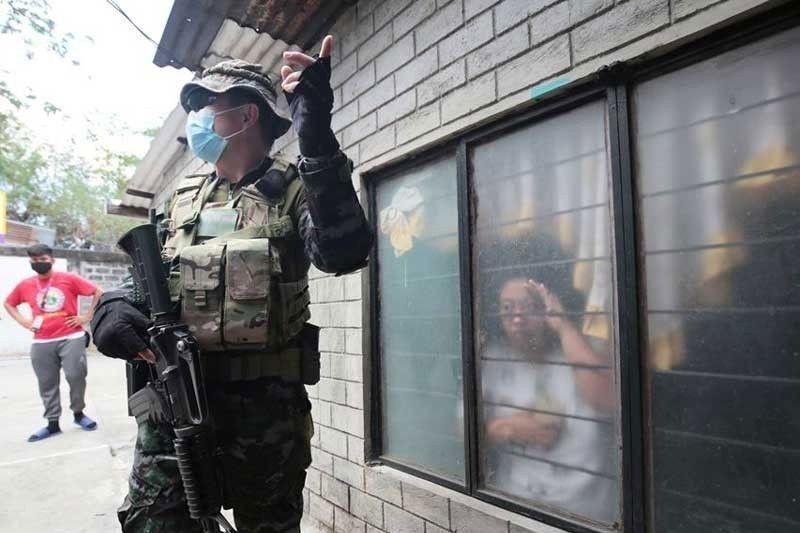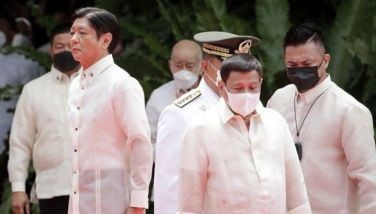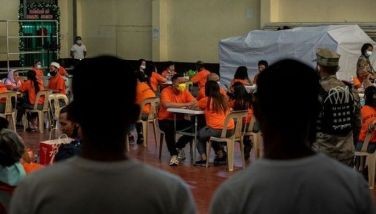Families in localized lockdowns to receive aid

MANILA, Philippines — Families in areas to be placed under localized lockdowns would receive financial aid under the Bayanihan 2 law as the government shuns region-wide community quarantines that may disrupt economic activity.
The law, signed by President Duterte last Friday, allocated P6 billion to fund social welfare programs like the Assistance to Individuals in Crisis. The AICS, a component of the government’s social amelioration program, provides emergency subsidies to households in areas affected by lockdowns.
Officials have announced plans to limit lockdowns to specific areas with high coronavirus infections as imposing regional quarantine restrictions may disrupt the livelihood of workers and the operations of businesses.
“We will provide P5,000 to P8,000 aid to those who will be affected by the granular lockdown declared by the local government,” presidential spokesman Harry Roque said at a press briefing yesterday.
The law also set aside P13 billion to fund cash-for-work programs for displaced workers like the COVID-19 Adjustment Measures Program, which assists affected overseas Filipino workers and local workers; Tulong Panghanapbuhay for Displaced/Disadvantaged Workers sanitation project; and the Abot Kamay ang Pagtulong sa OFWs program.
The amount will also be used to fund the unemployment or involuntary separation assistance for displaced workers or employees.
Meanwhile, a total of P9.5 billion was allocated for the programs of the transportation department, including the giving of P3 billion aid to passenger jeepney drivers affected by quarantine restrictions.
The law also allocated P13.5 billion for health-related responses like continuous employment of emergency human resources for health, hiring of additional health personnel, and augmentation of the operations of state-run hospitals.
The amount also covers the special risk allowance for all public and private health workers directly attending to or in contact with coronavirus patients for every month of service during the state of national emergency; actual hazard duty pay for all medical frontliners; life insurance, accommodation, transportation and meals of all public and private health workers; and compensation to workers who have contracted COVID-19 in the line of duty.
The government will spend P3 billion for personal protective equipment, protective suits, face masks, shoe covers, face shields and goggles to personnel in COVID-19 referral hospitals and P4.5 billion to fund the construction of temporary medical isolation and quarantine facilities, field hospitals, dormitories for frontliners, and the expansion of the capacities of government hospitals.
Bayanihan 2 also allocated P39.4 billion for programs designed to improve access to loans and P24 billion for direct cash or loan interest rate subsidies under the programs of the Agricultural Credit Policy Council.
Other items to be funded by the law are the training and subsidies for tourist guides (P100 million); development of smart campuses to implement flexible learning modalities (P3 billion); subsidies and allowances to qualified students (P600 million); subsidies and allowances of displaced teaching and non-teaching personnel (P300 million); additional scholarship funds for Technical Education and Skills Development Authority (P1 billion), and implementation of digital education and alternative learning modes (P4 billion).
Other expenses that will receive funding are allowances for national athletes and coaches (P180 million); augmentation of the foreign affairs department’s office of migrant workers affairs and repatriation-related expenses (P820 million); and programs for the tourism industry (P4 billion); construction and maintenance of isolation facilities (P4.5 billion), coronavirus-related research (P10 million); and the establishment of a computational research laboratory (P15 million).
3 gives
Sen. Francis Tolentino lauded the inclusion of the so-called “three-gives” or three monthly installment payment scheme of utility companies in the approved version of the Bayanihan 2.
Tolentino first introduced the payment scheme during plenary deliberations for Bayanihan 2, to provide much-needed relief for Filipinos in the payment of their electric, water and other utility bills during months of lockdown brought about by the enhanced community quarantine to prevent the spread of COVID-19.
Under Tolentino’s proposal, electric, water, telecommunications and other similar utilities are mandated to provide a minimum of 30-day grace period for the payment of bills due within the period of enhanced community quarantine or modified ECQ, without interest, penalties and other charges.
After the grace period, residential occupants and micro, small and medium enterprises (MSMEs) may settle their bills in three monthly installments, also without penalties, interest and other charges.
Tolentino said MSMEs and residential lessees affected by temporary work or operation stoppage are also given relief under Bayanihan 2.
He added that MSMEs and residential lessees are given a month-long grace period within the period of community quarantine to settle their obligation. The amount due within the period will be amortized in equal monthly installments until Dec. 31, 2020.
He noted the full “three-gives” provision of the Bayanihan 2 Law includes direct institutions providing electric, water, telecommunications and other similar utilities to implement a minimum of 30 days grace period for the payment of utilities falling due within the period of ECQ or MECQ without incurring interests, penalties and other charges.
After the grace period, Tolentino said unpaid residential and MSME utility bills could be settled on a staggered basis payable in not less than three monthly installments, subject to the procedural requirements of the concerned regulatory agencies in the imposition of such installment plan without interests, penalties and other charges. – Cecille Suerte Felipe
- Latest
- Trending



























